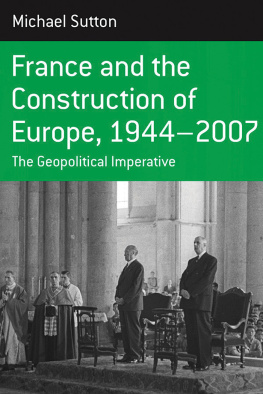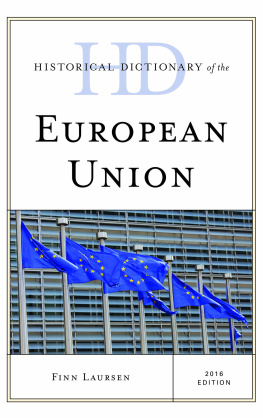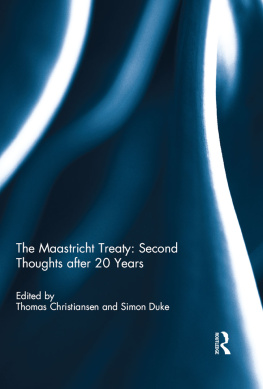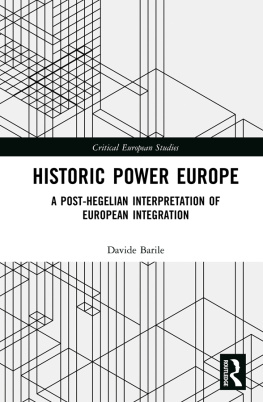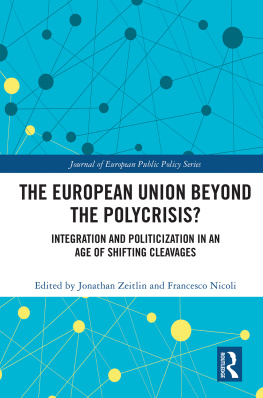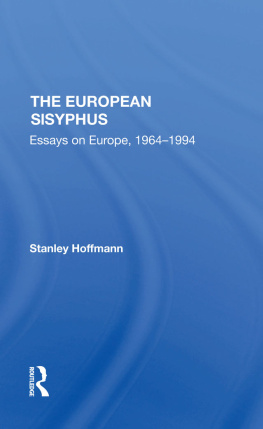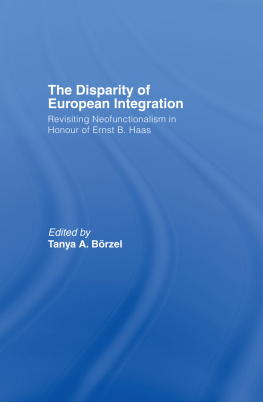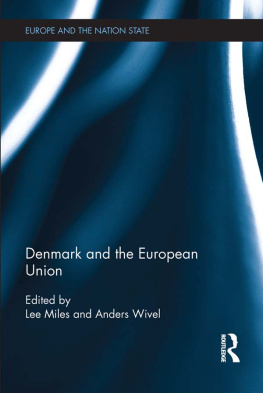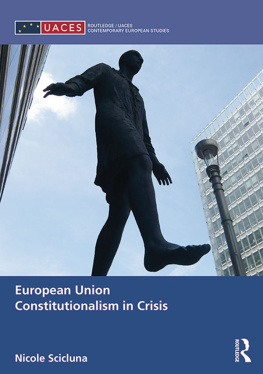An Imperfect Union
The New Europe: Interdisciplinary Perspectives
Stanley Hoffmann, Series Editor
An Imperfect Union: The Maastricht Treaty and the New Politics of European Integration
Michael J. Baun
The European Sisyphus: Essays on Europe, 1964-1994
Stanley Hoffmann
France, Germany, and the Western Alliance
Philip H. Gordon
FORTHCOMING
The European Union: Politics and Policies
John Spencer McCormick
Integrating Social Europe: The International Construction of a Democratic Polity
Wolfgang Streeck
The New Europe: Interdisciplinary Perspectives
First published 1996 by Westview Press
Published 2018 by Routledge
711 Third Avenue, New York, NY 10017, USA
2 Park Square, Milton Park, Abingdon, Oxon 0X14 4RN
Routledge is an imprint of the Taylor & Francis Group, an informa business
Copyright 1996 Taylor & Francis
All rights reserved. No part of this book may be reprinted or reproduced or utilised in any form or by any electronic, mechanical, or other means, now known or hereafter invented, including photocopying and recording, or in any information storage or retrieval system, without permission in writing from the publishers.
Notice:
Product or corporate names may be trademarks or registered trademarks, and are used only for identification and explanation without intent to infringe.
Library of Congress Cataloging-in-Publication Data
Baun, Michael J.
An imperfect union : the Maastricht Treaty and the new politics of European integration / Michael J. Baun.
p. cm. (The new Europe)
Includes bibliographical references and index.
ISBN 0-8133-2710-5 (he). ISBN 0-8133-2711-3 (pb)
1. European Union. 2. European federation. I. Title.
II. Series: New Europe (Boulder, Colo.)
JN30.B38 1996
341.242dc20
95-40995
CIP
ISBN 13: 978-0-8133-2711-2 (pbk)
For the past fifty years, the countries of Western Europe have been engaged in a fascinating and important experiment. For the first time in modern history, a group of independent nation-states have sought to integrate their economies and political decisionmaking structures to ensure peace and improve their joint capacity to meet the challenges of interdependence. After being launched in the 1950s, European integration bogged down in the 1960s and 1970s, only to be dramatically reborn in the 1980s with the dynamic Single Market (Europe 1992) project. The dramatic collapse of communism in Eastern Europe and the end of the cold war, however, have confronted the architects of European integration with an entirely new set of problems and challenges. This book examines how the European Union (EU) and its member states have responded in the immediate term to these challenges and what these challenges may mean for the longer-term development of the EU and European integration.
Nevertheless, writing about the EU is not an easy task at this particular time. One obvious reason is the difficulty inherent in writing about a current issue or topic, a problem exacerbated by the rapidly moving pace of events within Europe in recent years. However, the pace of change has slowed somewhat since the hectic period of 1989-1993, encompassing the fall of the Berlin Wall and the final ratification and adoption of the Maastricht Treaty on European Union. Even though the EU now prepares for its next major intergovernmental conference in 1996, a sequel of sorts to the Maastricht negotiations, this pending conference is unlikely to produce any dramatic developments or bold new steps in the direction of greater integration, for reasons explored in this book. With the situation in Europe and the EU having settled down in the mid-1990s, more detached and sober analysis of developments over the previous half-dozen years is now both possible and necessary.
Also making it difficult to write about the EU at this time is the turbulent state of EU studies. The relaunching of European integration in the 1980s brought about a resurgence of interest in, and debate between, the two dominant grand theories of integration: neofunctionalism, which emphasizes the role of supranational institutions and the dynamic of spillover, and intergovernmentalism, which stresses the centrality of nation-states and bargaining between national governments. Developments in the EU since 1989, however, including the Maastricht Treaty and the treaty ratification crisis, have posed a severe challenge for both grand theories and have prompted the search for new or alternative explanations of integration.
In this book I do not attempt a systematically theoretical explanation of EU developments since 1989. Nevertheless, I do operate on the basis of some key theoretical assumptions. I assume, for instance, that integration takes place because it is in the interests of the EUs member states. In keeping with this fundamentally intergovernmentalist perspective, I argue that developments in the EU, and in particular the Maastricht Treaty, represent essentially the response of European governments to the new geopolitical and security imperatives created by German unification and the end of the cold war. I also work from the assumption that the interests of the largest and most influential member states are those that matter most in EU affairs. For this reason, I give particular attention to the actions of Germany and France, though recognizing a key secondary role for Britain. At the same time, however, I agree with neofunctionalism in acknowledging the importance of institutions, and I attempt to explain how perceptions of national and state interests have been shaped, and in some cases transformed, by the previous decades of integration and interdependence.
If this book has a central theoretical claim, it is that the end of the cold war and German unification have made European integration once again primarily a matter of high politics. By this I mean that considerations of security and geopolitics, affecting both the Communitys internal balance and relations among its member states and the EUs external position and role, have again become the driving force of European integration, much as they were in the early postwar years. It may well be the case that after a period of rebalancing and consolidation, low politics issues (i.e., economics) will once again come to predominate within the EU. Given the fundamental nature of the regional and global geopolitical changes that have taken place since 1989, however, this new high politics moment for the EU will likely last for an extended period of time.
As this book goes to press, the EU is experiencing a new period of pessimism and malaise, a continuation of its post-Maastricht crisis. Despite the new high politics focus of the EU, however, in fact precisely because of it, my own view of the prospects for European integration is much more optimistic. I continue to regard further integration as both necessary and inevitable, although it will undoubtedly take new forms and directions in the future. Thus, my own interest in, and fascination with, the EU and European integration remain undiminished in this period of Europessimism, and I hope that this sentiment is transmitted in this book.


